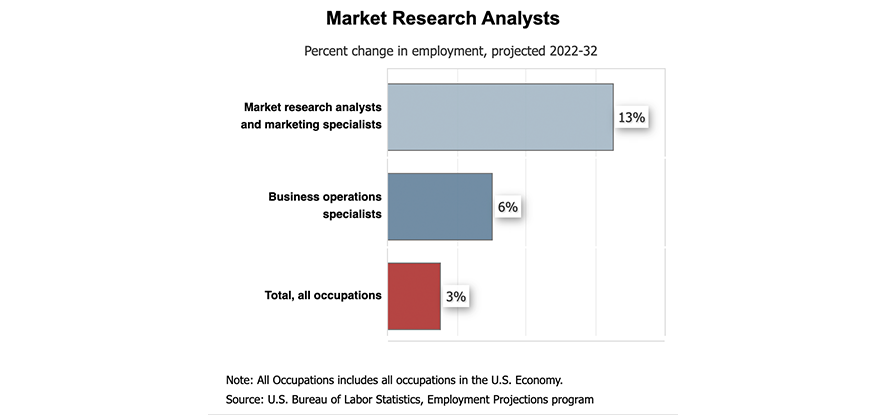Current Job Market Trends for Analysts

The role of a research analyst might be the perfect first step in your public policy career. This blog will walk you through the current research analyst job market and give you information on how to break into this space.
Current Research Analyst Job Market
In today's fast-paced and information-driven world, the demand for skilled research analysts is on the rise. These professionals are crucial in the decision-making process in various sectors as they play a pivotal role in shaping strategies and policies. Their ability to dissect complex data and translate it into actionable insights is invaluable in our data-centric age.
So what does the market currently look like for market research analyst jobs?
- In 2022 there were 868,600 research analyst jobs.
- Each year there are about 94,000 job openings for market research analysts.
- The average growth rate is expected to be 13% over the next 10 years, which is much faster than average.
- The median salary for research analysts in 2022 was $68,230 per year.

What Do Market Research Analysts Do?
Market research analysts use data to understand the complexities of the commercial landscape by using a variety of research methods and statistical techniques to interpret market data, which plays a crucial role in shaping business decisions.
Primarily, their work involves conducting detailed market research analysis to track sales trends and consumer behavior to extract key insights. They study customer demographics, preferences, and buying habits, using both qualitative and quantitative research. These data interpretations provide a clear picture of the market and trends, which is essential for companies to position themselves effectively in a competitive environment. Market research analysts contribute significantly to product development. By understanding consumer needs and preferences, they can weigh in on product features that are likely to succeed in the market. Their insights also help tailor marketing strategies that resonate with the target audience, ensuring that promotional efforts are effective and cost-efficient.
Is a Research Analyst a Good Job?

Being a market research analyst can be a deeply satisfying career for those who love to dive into data and influence real-world decisions..
Many market research analysts enjoy a diverse and dynamic work environment. You could be working on projects ranging from studying consumer behavior to analyzing economic trends, all while collaborating with different departments.
Public Policy Career Outcomes For Research Analysts
Those pursuing a career as a market research analyst can find rewarding careers in various domains:
Government
In the government sector, you will have the opportunity to influence policy at various levels—federal, state, or local. Working in government positions allows you to directly impact public policies, playing a crucial role in shaping the legislative and regulatory landscape of communities and the country.
Non-Profit
In the nonprofit sector, market research analysts contribute significantly to think tanks or policy-focused organizations. These settings offer a platform for conducting research, leading focus groups, developing policy recommendations, and engaging in advocacy work.
Working for a nonprofit organization often involves addressing social issues, influencing public policy, and striving towards societal improvements, making it a fulfilling choice for those driven by a mission to effect positive change.
Private Sector
In the private sector, individuals can work in various roles such as corporate communications, consulting, or government relations.
These positions often involve connecting businesses and government entities, advocating for corporate interests, and providing strategic advice based on an in-depth understanding of public policies. The private sector demands a blend of analytical skills and business acumen, making it a challenging yet rewarding field for public policy graduates.
How Much Does a Market Research Analyst Make?
Working in the field of data and market research is not only intellectually stimulating but also financially rewarding with competitive salaries. The Bureau of Labor Statistics notes that research analysts in the highest 10% (typically individuals with an advanced degree who work in management at large companies and enterprises) make upwards of $130,000 annually.
Salaries vary depending on several factors, such as experience, geographic location, and the industry. Most market research analysts start their careers with a bachelor's degree, which provides a solid foundation in the fundamental concepts of market research, data analysis, and business strategy.
However, earning a master's degree can significantly enhance a market research analyst's earning potential. Advanced degrees typically lead to higher starting salaries and greater opportunities for career advancement. Additionally, a master's degree can sometimes be a differentiating factor for more senior or specialized roles within the field.
Earning potential can also increase substantially with experience. Experienced research analysts with a track record of delivering actionable insights and driving business success are highly valued, and therefore,can command higher salaries. Besides the base salary, many market research analyst roles offer performance bonuses and other forms of compensation. Additionally, moving from entry-level positions to more senior roles, the job title often changes, reflecting increased responsibilities and higher compensation.

What Skills Do You Need to Become a Research Analyst?
Market research analyst jobs require technical and soft skill sets to navigate the complexities of market research and contribute valuable insights to decision-making processes.
Analytical Skills
Analyzing collected data involves dissecting large and complex technical research and data sets to extract insights. It requires a detail-oriented approach to ensure accuracy and the ability to see patterns and trends that are not immediately obvious.
Data Gathering
Beyond analyzing existing data, a research analyst often conducts primary research to gather new data. This skill involves designing research methodologies, collecting quantitative data, and then using this information to support business decisions.
Quantitative Data Analysis
Quantitative analysis uses statistical methods to analyze numerical data, which can provide critical insights into market conditions, consumer behaviors, and potential sales.
Data Visualization
Converting complex data into understandable visual aids is a key skill. Data visualization aids in the interpretation of data and makes the communication of findings more effective. It involves creating charts, graphs, and other visual aids that can clearly convey complex information.
Critical Thinking
Research analysts must be able to apply critical thinking when assessing data to make informed recommendations. This requires an ability to not only understand the data but also to evaluate its implications and potential impact on the business or policy decisions.
Communication
A research analyst must be skilled in writing reports and presenting findings in a clear, concise, and persuasive manner. It is crucial to be able to communicate complex information in an understandable and accessible manner. Effective communication also involves actively listening to feedback and collaborating with team members to refine and improve research outputs.
Technical Skills
Proficiency in data analysis software and methodologies is essential. This includes a range of statistical tools and software programs that aid in the collection, analysis, and presentation of data. Keeping up-to-date with the latest developments in these tools and continuously upgrading one's technical skill set is also vital for maintaining a competitive edge.
Adaptability
With the market constantly evolving and technology advancing, a successful research analyst must be adaptable, willing to continuously learn, and apply new techniques to stay ahead in the field.
Detail-Oriented Approach
Attention to detail is paramount in this role. Misinterpreting data or overlooking small details can lead to inaccurate conclusions. A detail-oriented approach ensures precision and reliability in research findings. It also involves methodically verifying and cross-checking information to guarantee the integrity and accuracy of the research.
How to Become a Research Analyst
Becoming a market research analyst involves a blend of education, skill development, and practical experience.
Educational Foundation
The first step in becoming a market research analyst is to establish a solid educational foundation. A bachelor's degree in a related field such as economics, business, statistics, or the social sciences is typically the minimum requirement. These programs provide a fundamental understanding of statistical analysis, and the principles of marketing and consumer behavior.
Advanced Degree for Enhanced Prospects
Pursuing a master's degree can be highly advantageous when it comes to job outlook. Specialized programs such as the Master of Public Policy (MPP) from Pepperdine University offer in-depth knowledge and advanced skills that are highly valued in this profession. A master’s degree not only enhances your understanding of market research but also equips you with advanced analytical and critical thinking skills.
Practical Experience
Practical experience can be achieved through internships, entry-level positions, or relevant project work. This experience allows aspiring analysts to apply their academic knowledge in real-world settings, gain insights into the industry, and develop their research and analytical skills.
Developing Key Skills
It's also important to focus on developing the key skills required for a market research analyst role. This includes data analysis, mastering various research methodologies, becoming proficient in statistical software, and refining your communication skills. These competencies are essential for effectively conducting market research and analyzing data.
Understanding Market Dynamics
Market research analysts work in a fast-paced field, so staying up-to-date with current market trends and technological advancements is important. This continuous learning can come from following industry news, attending workshops and seminars, and networking with professionals in the field.
Specialization
As you gain experience, consider specializing in a particular type of market research or industry. Specialization can make you more attractive to certain employers and can lead to more advanced roles within the field.
Professional Certification
While not always necessary, professional certification can further validate your expertise and commitment to the field. Certifications from recognized industry organizations can be an added advantage in your career progression.
Begin Your Career as a Research Analyst at Pepperdine University's Graduate School of Public Policy
With a degree from Pepperdine University's School of Public Policy, you're preparing for more than just a job, you're preparing for a life of leadership.
As a research analyst, you'll tackle complex challenges and offer solutions with far-reaching impacts. Your insights can shape policies and improve lives. If you're passionate about data and eager to make a positive change, this career offers endless opportunities to learn and grow.
Pepperdine's program equips you with both the technical skills and the ethical perspective to use your knowledge wisely. You'll join a community focused on understanding the deeper implications of policy analysis. This isn't just about becoming an analyst; it's about becoming a leader who uses data for the greater good. Start your journey today at Pepperdine University and find out how you can launch a meaningful career as a research analyst.